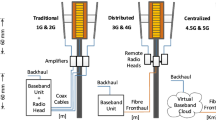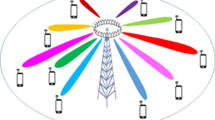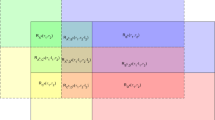Abstract
Carrier aggregation (CA) technique has been adopted by 3GPP LTE-Advanced due to its ability of enhancing the spectrum efficiency and peak data rates through aggregating multiple component carriers (CCs). Two main factors make power control optimization very essential for CA-MIMO radio link: the different channel characteristics in multiple CCs, and multiple power constraint conditions (per-CC, per-antenna and pertransmitter power constraints) in the actual CA system deployment. This paper firstly derives the degenerate conditions of optimal power allocation for a single-transmitter CA-MIMO system. Stemming from the derived degenerate conditions, we propose a modified hybrid gradient optimal power allocation(MHGOPA) algorithm to maximize the system performance. Simulation results verify the validity of the proposed resource allocation approach by comparing with baseline average power allocation algorithm. Finally, we extend the MHGOPA algorithm into a heterogeneous CA network with multiple transmitters working simultaneously.
Similar content being viewed by others
References
Yuan G, Zhang X, Wang W, et al. Carrier aggregation for LTE-advanced mobile communication systems. IEEE Commun Mag, 2010, 48: 88–93
Cui Q M, Luo B, Huang X Q, et al. Closed-form solution for minimizing power consumption in coordinated transmissions. EURASIP J Wirel Commun Netw, 2012, 2012: 122
Yu W, Lan T. Transmitter optimization for the multi-antenna downlink with per-antenna power constraints. IEEE Trans Signal Process, 2007, 55: 2646–2660
Zhang H, Xu X D, Li J Y, et al. Multicell power allocation method based on game theory for inter-cell interference coordination. Sci China Ser F-Inf Sci, 2009, 52: 2378–2384
3GPP. Basic UL power control methods in LTE-advanced. 3GPP R1-100216. 2010
3GPP. Further advancements for E-UTRA LTE-advanced feasibility studies in RAN WG4 (Release 9). 3GPP TR 36.815 V0.34.0. 2009
Oh J, Kim S J, Cioffi J M. Optimum power allocation and control for OFDM in multiple access channels. In: IEEE Vehicular Technology Conference, Los Angeles, 2004. 774–778
Reider N, Fodor G. On opportunistic power control for MIMO-OFDM systems. In: IEEE Global Communications Conference Workshops, Miami, 2010. 793–798
Gao Q, Zhang X, Li J. Power control of V-BLAST system with per-antenna power constraints. IEEE Commun Lett, 2007, 11: 833–835
Cui Q M, Huang X Q, Luo B, et al. Capacity analysis and optimal power allocation for coordinated transmission in MIMO-OFDM systems. Sci China Inf Sci, 2012, 55: 1372–1387
Nallanathan A, Chang L. Eigenbeam-space division multiplexing for OFDM systems with optimum resource allocation. In: IEEE Global Telecommunications Conference, Dallas, 2004. 2366–2370
Wang N, Blostein S D. Approximate minimum BER power allocation for MIMO spatial multiplexing systems. IEEE Trans Commun, 2007, 55: 180–187
Nam S H, Shin O, Lee K B. Transmit power allocation for a modified v-blast system. IEEE Trans Commun, 2004, 52: 1074–1079
Wang H, Rosa C, Pedersen K. Performance of uplink carrier aggregation in LTE-advanced systems. In: IEEE Vehicular Technology Conference Fall, Ottawa, 2010. 1–5
Fleteher R, Reeves C. Function minimization by conjugate gradient. J Comput, 1964, 7: 149
Luenberger D G. Linear and Nonlinear Programming. 3rd Ed. New York: Springer, 2009. 278–281
Zeng Q G. An extension of Rosen’s gradient projection method and a proof of its global convergence. Acta Math Appl Sin, 1991, 3: 187–193
Author information
Authors and Affiliations
Corresponding author
Rights and permissions
About this article
Cite this article
Cui, Q., Kang, P., Huang, X. et al. Optimal power allocation for homogeneous and heterogeneous CA-MIMO systems. Sci. China Inf. Sci. 56, 1–14 (2013). https://doi.org/10.1007/s11432-012-4775-4
Received:
Accepted:
Published:
Issue Date:
DOI: https://doi.org/10.1007/s11432-012-4775-4




